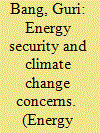| Srl | Item |
| 1 |
ID:
094834


|
|
|
|
|
| Publication |
2010.
|
| Summary/Abstract |
Why is it so difficult to change the energy policy status quo away from dependence on fossil fuels when the need to become less dependent on imported oil seems to be generally accepted by US politicians? In recent energy debates in the House and Senate, references to climate change and energy security were frequently used as a rationale for the need for energy policy change. But policymakers were not in agreement about what policy programs would be the best alternative or what goals the programs were to achieve in terms of addressing energy security or climate change, or both at the same time. The paper explores whether putting energy security and climate change on the decision making agenda simultaneously helped craft a political compromise in the 110th Congress-the Energy Independence and Security Act of 2007, and points out how the political institutions of the US structured interaction and affected policy outcome, and ultimately the chance of changing the energy policy status quo.
|
|
|
|
|
|
|
|
|
|
|
|
|
|
|
|
| 2 |
ID:
080166


|
|
|
|
|
| Publication |
2007.
|
| Summary/Abstract |
To enhance effective cooperation, the Marrakesh Accords provide a compliance system for the international climate regime. An innovative part of this system is an Enforcement Branch authorised to apply punitive consequences against countries that fail to comply with their Kyoto obligations. While previous research has primarily focused on the ability of this compliance system to deter non-compliance, this article discusses whether the actual use of punitive consequences will induce a non-compliant country to return to compliance. The Marrakesh Accords explicitly emphasise that the punitive consequences shall be aimed at the restoration of compliance. However, we show that the application of punitive consequences will accomplish this in only exceptional circumstances
|
|
|
|
|
|
|
|
|
|
|
|
|
|
|
|
| 3 |
ID:
110830


|
|
|
|
|
| Publication |
2012.
|
| Summary/Abstract |
According to two-level game theory, negotiators tailor agreements at the international level to be ratifiable at the domestic level. This did not happen in the Kyoto negotiations, however, in the US case. We interviewed 26 German, Norwegian, and US participants in and observers of the climate negotiations concerning their views on three explanations for why the United States did not become a party to Kyoto. Explanation 1 argues that Kyoto delegations mistakenly thought the Senate was bluffing when adopting Byrd-Hagel. Explanation 2 contends that Europeans preferred a more ambitious agreement without US participation to a less ambitious agreement with US participation. Finally, explanation 3 suggests that in Kyoto the Clinton-Gore administration gave up on Senate ratification, and essentially pushed for an agreement that would provide them a climate-friendly face. While all explanations received some support from interviewees, explanation 1 and (particularly) explanation 3 received considerably more support than explanation 2.
|
|
|
|
|
|
|
|
|
|
|
|
|
|
|
|